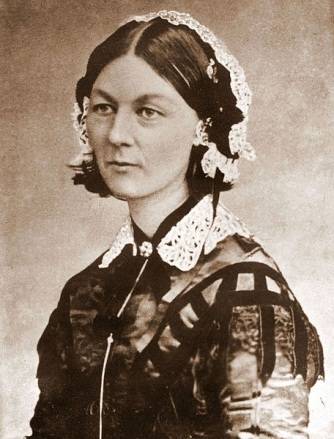The Lady with the Lamp

Florence Nightingale, who lived near Matlock, is credited with reforming nursing in the mid-19th Century. Her papers on hospital planning and organisation are said to have had a profound effect on nurse training in England and throughout the world.
Although Florence was not born in Derbyshire, her links with the county can be traced through her family. She was, in fact, from a wealthy, reformist Derbyshire family who kept homes in both Derbyshire and Hampshire. The family's Derbyshire home was at Lea Hurst, near Matlock.
Florence's father, William Shore, had inherited the Lea Hurst estate from his wife's uncle, Peter Nightingale, along with the right to assume family's arms and the Nightingale name. Florence was born in Tuscany, and named after the Italian city of her birth, in May 1820. She had one sister, Parthenope (the Greek name for the Italian city of Naples).
At the age of 17, Florence claimed to have had her calling from God while in the gardens at Embley, the family's Hampshire home. She claimed to have heard God's voice calling her to do his work - though she had no idea at that moment what that work would be.
She embarked on three months of nurse training. That training led to her first job - a Superintedent at a Harley Street women's nursing home. Her next step forward came when Florence was 34. During the Crimean War, British newspapers reported that wounded soldiers were being poorly cared for and treated in terrible conditions. The men were kept in rooms without blankets or decent food and remained unwashed. Sidney Herbert, the War Minister, knew of Florence Nightingale's work at Harley Street and asked her to ensure nurses were sent into the military hospitals in Turkey and put to good use.
Florence Nightingale arrived in Scutari with a team of 38 nurses in November 1854, much to the dismay of the doctors there who resented a woman's interference. However, as more new wounded arrived the nurses were asked to help out - and were soon in high demand. But Florence's care went beyond medical boundaries. She took charge of some of the soldiers' affairs, sending mail and money home to their families. She persuaded the doctors to let the men have reading rooms and worked tirelessly to improve nutrition and sanitation and reduce mortality rates.
It was in the Crimea she became known as the as "the lady with the lamp" because of the late hours she worked as she tended to the ill and wounded. In return, the men adorned her with boundless respect - and that led to a public fund being set up for her to carry on her work. She returned to England in 1856 and, four years later, established the Nightingale Training School for nurses at St Thomas' Hospital in London.
Her nurses were sent to hospitals throughout Britain and introduced the ideas and practices they had learnt. Nightingale's theories, published in 'Notes on Nursing' in 1860 were hugely influential and her advice on sanitation, military health and hospital planning established practices which are still in existence today.